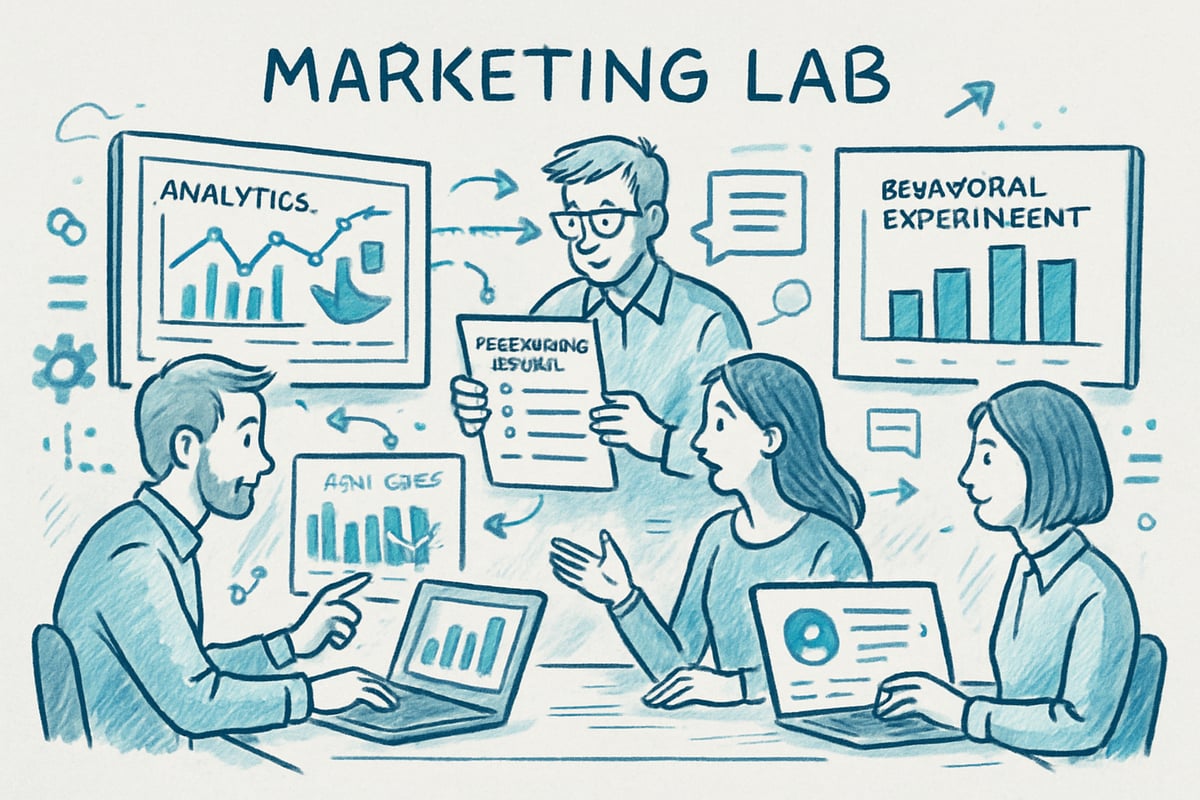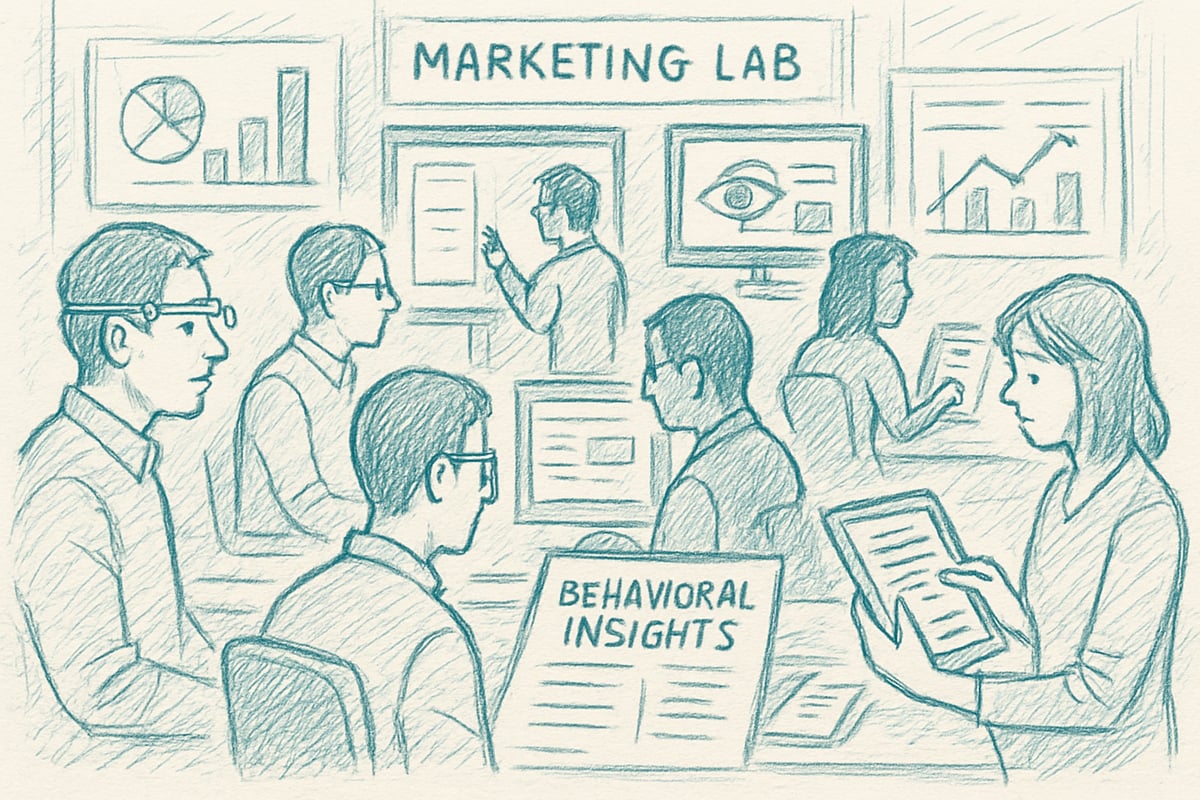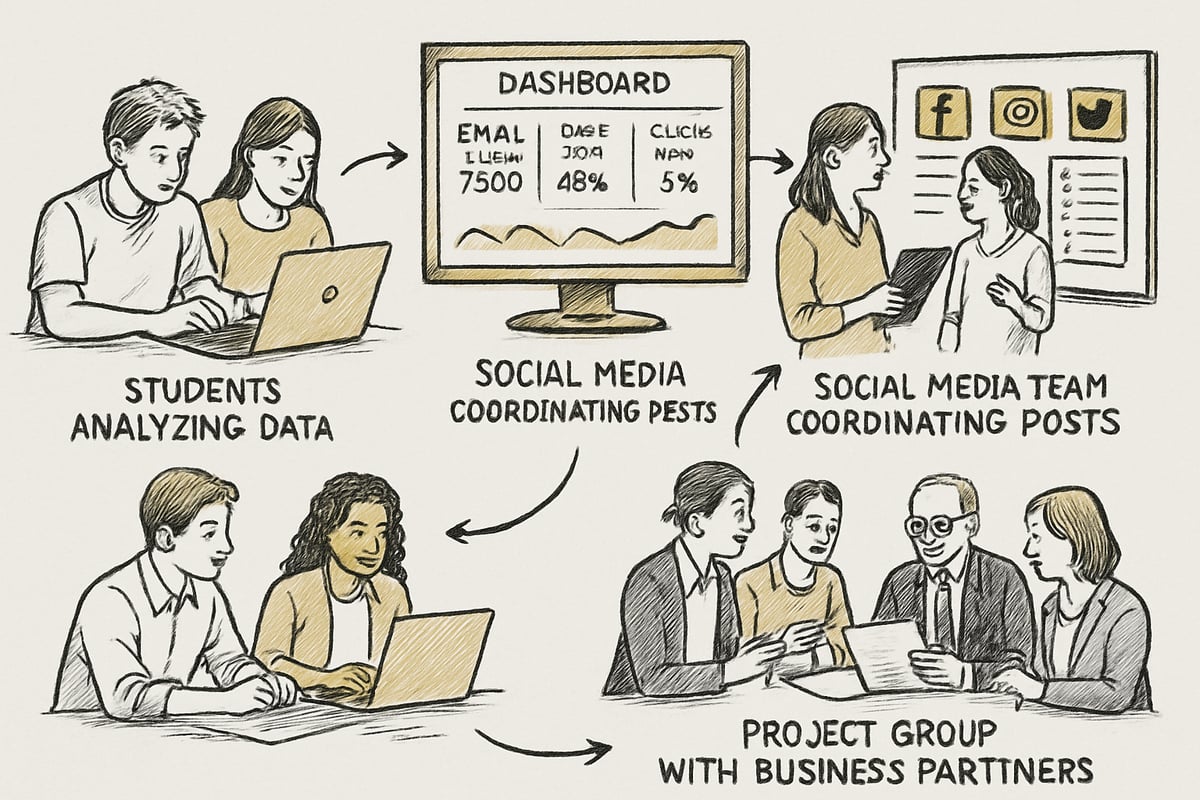In the rapidly evolving digital marketplace, staying ahead in 2025 requires more than just keeping pace. Brands must lead with innovation, adaptability, and a clear focus on results. This guide reveals marketing lab strategies grounded in research to help you outpace competitors and achieve sustainable growth.
Explore the forefront of marketing research, digital engineering, and behavioral insights. Discover how real-world marketing lab applications and future-ready best practices can redefine your approach. Ready to master these proven, data-driven methods? Apply them now to unlock your path to marketing excellence in 2025.
The Evolution of Marketing Labs: From Research Hubs to Strategic Powerhouses
The marketing lab has undergone a remarkable transformation in recent years. Once limited to academic research and basic consumer studies, these labs now serve as the backbone of strategic business innovation. Their evolution is reshaping how organizations use data, technology, and behavioral insights to drive sustainable growth.

The Changing Role of Marketing Labs in Business Strategy
Marketing labs are no longer confined to theoretical research. They now play a pivotal role in shaping business strategy by integrating digital growth solutions into daily operations. Companies increasingly turn to the marketing lab for competitive landscape analysis, seeking data-driven approaches that keep them ahead in crowded markets.
A standout example is Purdue’s Marketing Lab engineering digital experiences for business growth. This lab bridges the gap between academic research and real-world business challenges. It combines expertise from business schools and industry partners to deliver tangible results, from analytics to customer relationship management.
Modern marketing labs have expanded their reach, offering services that span analytics, CRM, web, and social media. Whether supporting established enterprises or agile startups, the marketing lab provides tailored solutions that fuel digital transformation. Their collaborative approach often involves joint projects with business schools, corporate partners, and cross-functional teams, accelerating innovation and knowledge transfer.
The marketing lab’s role as a strategic powerhouse is clear. By blending research, technology, and business acumen, these labs help organizations adapt to rapid changes and seize new opportunities. Their influence extends across industries, setting new standards for data-driven decision-making.
Key Functions and Capabilities of Modern Marketing Labs
Today’s marketing lab delivers a comprehensive suite of functions designed to uncover growth opportunities and optimize performance. These capabilities include:
- Conducting advanced surveys and market segmentation to identify untapped markets
- Using ETL processes and data analytics for actionable business intelligence
- Implementing robust web analytics and tracking systems for real-time insights
- Managing CRM platforms for targeted, automated campaigns
- Elevating social media engagement and publishing to boost brand presence
Many marketing labs offer real-world projects, giving students and practitioners essential hands-on experience. For instance, Purdue’s use of Salesforce Marketing Cloud demonstrates how a marketing lab can automate targeted email campaigns and track results with precision.
Behavioral research is also deeply integrated into the modern marketing lab. By applying insights from consumer psychology, labs refine messaging and product offerings to better align with customer preferences.
As marketing lab functions continue to evolve, their impact on business outcomes grows. The combination of technical, analytical, and behavioral expertise positions the marketing lab as an essential driver of innovation and sustainable growth.
Step-by-Step: Building a Data-Driven Marketing Lab Strategy for 2025
Unlocking the full potential of your marketing lab in 2025 requires a systematic, data-driven strategy. By following this comprehensive step-by-step approach, you can position your team to outpace the competition, adapt quickly, and drive measurable growth. Each step builds on the last, ensuring your lab is both agile and impactful.

Step 1: Establish Clear Objectives and KPIs
Begin by defining the vision and mission for your marketing lab. Align objectives with your organization’s digital growth goals. Are you aiming to boost brand awareness, increase conversions, or improve customer retention? Set clear, measurable KPIs to track progress.
Consider metrics such as open rates, click-through rates, conversion rates, and customer lifetime value. Use customized dashboards to monitor these KPIs in real time. This ongoing visibility helps your team stay focused and agile.
A well-structured marketing lab prioritizes transparency and accountability. By embedding KPIs into daily operations, your lab becomes a reliable engine for strategic decision-making and business growth.
Step 2: Harness Advanced Marketing Research Techniques
Next, leverage advanced research methods to uncover actionable insights. Psychometric surveys and behavioral experiments, as implemented by leading institutions, provide a deeper understanding of your audience. These tools help segment your market and identify emerging opportunities.
Conduct regular competitive landscape analyses to gauge your position. Use ETL (Extract, Transform, Load) processes to transform raw data into meaningful intelligence. This ensures your marketing lab operates with data integrity and precision.
Collaboration with academic partners and industry experts can further enhance research quality. By integrating these techniques, your marketing lab stays at the forefront of innovation and consumer insight.
Step 3: Implement Cutting-Edge Digital Tools and Platforms
Selecting the right digital tools is critical for operational efficiency and campaign success. Start by choosing a CRM solution, such as Salesforce Marketing Cloud, to automate and personalize campaigns. Deploy web analytics platforms tailored to your business needs for detailed performance tracking.
Develop interactive dashboards that visualize traffic sources, audience demographics, and conversion funnels. These tools enable your marketing lab to make informed, data-driven decisions. For a comprehensive overview of essential automation tools and their role in modern lab operations, see the Marketing Automation Tools Overview.
Regularly update your digital stack to keep pace with evolving technology. This ensures your marketing lab remains agile, scalable, and ready to implement new strategies.
Step 4: Integrate Behavioral Insights into Strategy
Incorporate behavioral science to refine your lab’s marketing strategies. Use consumer psychology findings to tailor messaging, offers, and user experiences. Behavioral lab studies, such as those focusing on payment methods or risk preferences, reveal what motivates your audience.
Test hypotheses through A/B and multivariate experiments. Small tweaks in copy, design, or timing can yield significant improvements. Make experimentation a core habit within your marketing lab to foster a culture of learning and continuous improvement.
By systematically applying behavioral insights, your marketing lab can deliver highly relevant and persuasive campaigns that resonate with customers.
Step 5: Foster Collaboration and Continuous Learning
A high-performing marketing lab thrives on collaboration across teams. Involve marketing, analytics, IT, and research specialists in each stage of strategy development. Diverse perspectives spark creativity and drive innovation.
Offer real-world project opportunities to students and staff. These experiences build practical skills and ensure your lab remains a hub for talent development. Encourage ongoing training in analytics, research ethics, and the latest digital tools.
Facilitate regular knowledge-sharing sessions to keep the team aligned. By investing in continuous learning, your marketing lab adapts quickly to industry shifts and maintains a competitive edge.
Step 6: Measure, Optimize, and Scale
Establish a regular cadence for performance audits. Compare outcomes against established KPIs and identify gaps or opportunities for improvement. Use data-driven feedback loops to refine both strategies and tactics.
Successful initiatives should be scaled across channels and campaigns. Document lessons learned and best practices, so your marketing lab builds a library of proven solutions. Flexibility and agility are key, as the marketing landscape will continue to evolve.
By making optimization an ongoing process, your marketing lab is positioned to deliver sustainable growth and consistent results. Regular measurement and scaling ensure your lab’s impact grows year after year.
Leveraging Behavioral Marketing Labs for Deeper Consumer Insights
Behavioral research has become a cornerstone of the modern marketing lab. Today, organizations recognize that understanding consumer motivations goes far beyond simple demographics. By leveraging behavioral science, marketing lab teams can unearth deeper insights into decision-making processes, preferences, and emotional drivers.

The Power of Behavioral Research in Marketing
Every marketing lab that aims to stay ahead in 2025 must integrate behavioral research into its core strategy. Techniques such as psychometric surveys and controlled behavioral experiments are now standard practice. For example, Eller College’s marketing lab uses psychometric tools to map personality traits to purchasing behavior, revealing patterns that traditional segmentation often overlooks.
Behavioral experiments allow teams to observe real responses to changes in product design, pricing, or messaging. Classic studies, like those exploring the endowment effect, show how simply owning a product can increase its perceived value. Similarly, research on gamified financial platforms demonstrates how interactive elements can drive engagement and retention.
Collaboration is essential. Faculty, PhD students, and lab managers work together to design robust experiments and analyze data. This teamwork ensures that each marketing lab produces reliable, research-backed insights that inform branding, pricing, and advertising strategies.
Ethical data collection and analysis form the backbone of a responsible marketing lab. Training programs, often led by lab supervisors, instill best practices in research ethics and participant privacy. As technology evolves, the integration of AI with behavioral research offers even richer insights. For a closer look at how AI is shaping this field, explore Behavioral Insights with AI.
Best Practices for Implementing Behavioral Insights
To translate research into real-world impact, every marketing lab should follow proven best practices. First, integrate behavioral findings into campaign design and customer journey mapping. This approach allows for the personalization of offers and messages that resonate on a psychological level.
Regularly reviewing and updating research methodologies is critical. As consumer behavior shifts, so must the tools and techniques used by marketing lab teams. Certificate programs and hands-on internships provide ongoing education, ensuring that both students and professionals remain at the forefront of behavioral analytics.
Maintaining strict ethical standards is vital. Each marketing lab must safeguard participant data and ensure compliance with evolving privacy regulations. Collaborations between faculty, students, and industry partners further strengthen the research process, bringing a diversity of perspectives to every project.
By consistently applying these best practices, a marketing lab can transform empirical behavioral insights into measurable business outcomes. This focus on ethics, collaboration, and continuous learning ensures that marketing strategies remain both effective and future-proof.
Real-World Applications: Case Studies from Leading Marketing Labs
Unlocking the true potential of a marketing lab requires turning theory into measurable outcomes. Leading institutions demonstrate how structured experimentation and analytics drive real business growth. Through these case studies, you will see how marketing lab strategies translate into practical, high-impact solutions.

Email Marketing with CRM Tools
Modern marketing lab teams are redefining email marketing by aligning campaigns with strategic business objectives. By leveraging CRM platforms like Salesforce Marketing Cloud, they automate segmentation and personalize outreach.
- Advanced segmentation ensures messages reach the right audience.
- Automation tools optimize send times and increase relevance.
- Custom dashboards track open rates, click-through rates, and conversions.
These metrics allow marketing lab practitioners to make informed adjustments, boosting engagement and driving measurable growth. The iterative, data-driven approach ensures each campaign is refined for maximum impact.
Web Analytics and Tracking Implementation
A marketing lab excels at transforming raw website data into actionable insights. Teams start by auditing site performance, focusing on user behavior and conversion paths.
- Analytics platforms capture real-time traffic and user demographics.
- Data visualization tools highlight top-performing channels and content.
- Regular audits reveal opportunities for optimization and growth.
For example, Purdue’s marketing lab developed a comprehensive analytics program that mapped traffic sources and search performance. This approach enables businesses to adapt strategies quickly, ensuring digital investments yield tangible results.
Social Media Engagement Enhancement
Increasing brand presence online is a core function of the marketing lab. By analyzing social engagement data, lab teams identify high-performing content and optimize publishing schedules.
- Targeted publishing boosts reach across key platforms.
- Analytics pinpoint content types that drive the most interaction.
- Engagement rates and audience growth are tracked over time.
These insights help the marketing lab refine messaging, strengthen community ties, and maximize ROI from social channels. Consistent measurement and testing keep campaigns relevant and effective in an evolving digital landscape.
Student-Led Marketing Projects and Experiential Learning
Real-world experience is a cornerstone of the marketing lab model. Students collaborate with academic and business partners on live projects, gaining hands-on expertise.
- Internships and assistant roles immerse students in data collection, analytics, and campaign design.
- Faculty and lab managers provide structured guidance and feedback.
- Programs like Purdue's Online Digital Marketing Certificate Course offer specialized training in AI-powered marketing lab techniques.
This experiential learning not only builds essential skills but also delivers fresh solutions to partner businesses. The marketing lab becomes a launchpad for both student careers and organizational innovation.
Future-Proofing Your Marketing Lab: Trends and Best Practices for 2025
As the digital landscape shifts, future-proofing your marketing lab demands a forward-thinking approach. Staying ahead means embracing transformative technologies, fostering collaboration, and building a foundation of ethical, data-driven practices. Let’s explore the essential trends and best practices shaping marketing lab success in 2025.
Embracing AI and Automation in Marketing Labs
Integrating artificial intelligence is redefining what a marketing lab can achieve. AI-driven analytics uncover deeper insights, providing teams with predictive forecasting and granular segmentation. Automation streamlines campaign management, reporting, and segmentation, freeing up talent for strategic innovation.
Modern marketing lab workflows often include machine learning models that analyze customer journeys and optimize touchpoints in real time. For a closer look at how AI is transforming these environments, see AI for Marketing Labs, which explores practical applications and emerging tools.
Implementing AI is not just about technology. It requires training, ethical oversight, and a readiness to adapt as algorithms evolve. By championing AI, your marketing lab positions itself at the forefront of digital innovation.
Expanding Cross-Disciplinary Collaboration
A future-ready marketing lab thrives on collaboration between marketers, data scientists, psychologists, and business strategists. Integrating diverse perspectives accelerates innovation and leads to more holistic solutions.
Joint projects between academic institutions and industry leaders are becoming the norm. Faculty, PhD students, and practitioners work side by side, combining theoretical rigor with practical problem-solving. This synergy enables the marketing lab to address complex market challenges and develop robust, actionable strategies.
Encouraging open communication and regular knowledge sharing is key. Hosting workshops and interdisciplinary seminars can spark creative breakthroughs and keep your marketing lab ahead of the curve.
Prioritizing Ethics and Data Privacy
With greater access to consumer data, a marketing lab must prioritize privacy and ethical standards. Compliance with regulations such as GDPR and CCPA is non-negotiable. Training staff and students in responsible data handling ensures trust and protects your organization from legal risks.
Certification programs, like the CITI initiative, equip marketing lab teams with up-to-date knowledge on research ethics. Establishing clear protocols for data collection, storage, and participant consent reinforces a culture of integrity.
Regular audits and transparency reports help maintain high standards. An ethical marketing lab not only safeguards its reputation but also builds stronger relationships with clients and consumers.
Personalization and Customer-Centricity
Personalization is at the heart of every competitive marketing lab strategy for 2025. Leveraging behavioral and demographic data allows for highly tailored campaigns that speak directly to individual preferences.
Continuous testing, such as A/B and multivariate experiments, refines messaging and offers for optimal engagement. The marketing lab uses dynamic content and real-time analytics to deliver relevant experiences across every channel.
Customer-centricity means listening to feedback and adapting quickly. By focusing on the customer journey, your marketing lab can create memorable interactions that drive loyalty and growth.
Scaling Real-World Impact through Education and Partnerships
To maximize its influence, a marketing lab must invest in education and partnerships. Internship programs and experiential learning opportunities bridge the gap between theory and practice, preparing students for industry challenges.
Collaboration with business partners accelerates digital transformation and fosters innovation. For example, structured lab internships and joint projects allow the marketing lab to tackle real-world problems and deliver measurable results.
Building strong relationships with academic and industry stakeholders ensures a steady flow of fresh ideas and talent. This approach keeps the marketing lab agile and responsive to market changes.
Measuring Success and Adapting to Change
A future-proof marketing lab excels at measurement and adaptation. Establish robust feedback loops by tracking KPIs, analyzing outcomes, and acting on insights. Real-time dashboards and regular performance reviews guide strategic pivots when market conditions shift.
Adopting proven frameworks, such as those outlined in Marketing Processes and Strategy, helps streamline operations and maintain focus on core objectives. Updating the marketing lab’s capabilities ensures ongoing relevance and competitiveness.
Staying proactive, rather than reactive, empowers your marketing lab to navigate uncertainty and seize new opportunities for growth.
Getting Started: How to Access Marketing Lab Resources and Opportunities
Embarking on your marketing lab journey opens the door to transformative business growth and career development. Whether you are a business leader, student, or researcher, understanding how to access and leverage marketing lab resources is the first step toward unlocking real-world impact.
For Businesses: Partnering with Marketing Labs
Businesses seeking a competitive edge can benefit immensely from engaging with a marketing lab. The process typically involves reaching out to university partnership offices or lab managers, outlining your business objectives, and exploring collaboration models.
Key benefits include:
- Access to advanced analytics and digital tools
- Customized research tailored to your market challenges
- Opportunities to pilot new marketing strategies with expert guidance
For example, Purdue offers partnership opportunities that connect companies with student talent and cutting-edge research, ideal for driving digital transformation. These engagements often result in innovative solutions and measurable growth for participating organizations.
For Students: Gaining Real-World Experience
Students can gain invaluable hands-on experience by joining a marketing lab as interns or lab assistants. Application processes generally include submitting resumes, interviews, and sometimes participation in assessment projects.
Skills developed through marketing lab involvement:
- Data collection and analysis
- Use of CRM and analytics platforms
- Research ethics and teamwork
At Eller College, students have the chance to work directly with faculty on real-world marketing challenges, enhancing both technical and professional skills. Such roles provide a springboard for careers in digital marketing, analytics, and business strategy.
For Researchers and Educators: Building and Managing Labs
Faculty and educators play a critical role in establishing and managing a marketing lab. Recruiting and training qualified lab staff ensures smooth operations and maintains high research standards.
Key responsibilities include:
- Designing research protocols and supervising projects
- Overseeing data privacy and ethical compliance
- Facilitating collaboration between students, industry partners, and academic departments
Eller’s structured approach to lab management demonstrates the value of clear roles and ongoing training for lab supervisors and assistants. This model fosters a culture of innovation and accountability within the marketing lab.
Accessing Training and Certification Programs
Continuous learning is essential for maximizing the impact of any marketing lab. Training and certification programs help students and professionals stay current with evolving digital tools and ethical standards.
Options include:
- Research ethics certifications (e.g., CITI program)
- University-led workshops on analytics and digital marketing
- Graduate certificates that deepen expertise in core areas
For those seeking advanced skills, Purdue’s Digital Marketing & Analytics Graduate Certificate provides rigorous training in data-driven marketing strategies and analytics platforms.
Connecting with Marketing Lab Communities
Joining a marketing lab community provides access to a vibrant network of peers, mentors, and industry leaders. Ways to get involved include:
- Participating in lab-sponsored events and studies
- Contacting lab managers or faculty supervisors for collaboration
- Becoming a member of professional associations related to marketing research
Both Eller and Purdue offer contact resources for prospective partners and participants, making it easy to connect and start building relationships that drive innovation.
Maximizing the Value of Marketing Lab Engagement
To fully realize the benefits of marketing lab involvement, organizations and individuals should focus on continuous learning and relationship building. Track outcomes from lab-driven initiatives, celebrate successes, and seek feedback for ongoing improvement.
Building long-term partnerships with academic and industry labs ensures sustained access to expertise, resources, and talent. By leveraging marketing lab opportunities, you can stay at the forefront of digital marketing innovation.
